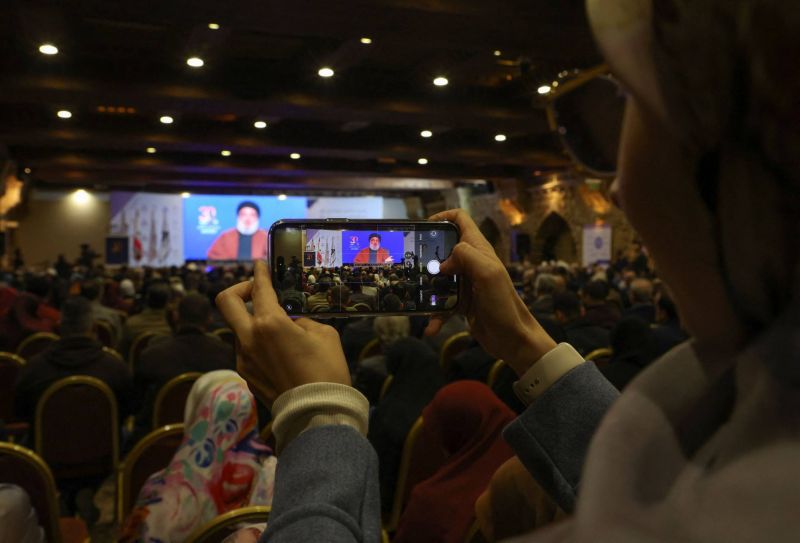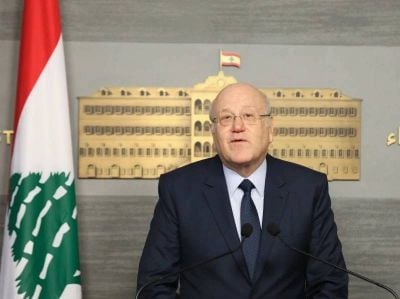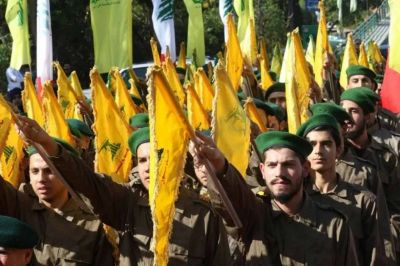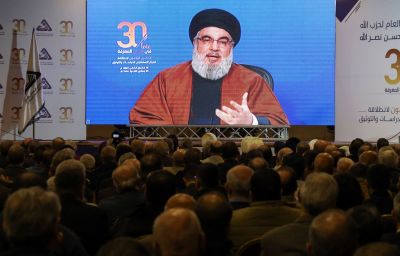
A supporter of Hezbollah leader Hassan Nasrallah uses a mobile phone to take a picture as he addresses his supporters through a screen in Beirut's southern suburbs on Jan. 19, 2023. (Credit: Mohamed Azakir/Reuters)
Hezbollah Secretary-General Hassan Nasrallah again reiterated on Thursday the characteristics of the Lebanese president he would like to see elected.
Lebanon has been without a head of state since Oct. 31, when the mandate of Michel Aoun, a political ally of Hezbollah, ended.
Nasrallah on Thursday said he wants a president "who does not submit to American threats," asserting that there is an "American blockade" that explains the present political impasse but also the economic, financial and social crisis afflicting Lebanon since 2019.
"We are not looking for a president of the republic only to pass the next six years, because these years will be decisive. We cannot be satisfied with the election of any head of state. We want a president and with him a government, so that we can save the country," the head of the pro-Iranian party insisted, in his second televised speech of the week, this one delivered on the occasion of the 30th anniversary of a research center affiliated with Hezbollah.
'A president who does not fly out of Baabda Palace'
"I pleaded in my meeting with Gebran Bassil for a president who does not fly out of Baabda Palace if the Americans blow him away. We want a president who does not submit to American threats," Nasrallah said, before adding: "People must be patient. If you want any president for the next six years, that is easy. But we want a head of state with a certain caliber."
Since September, 11 parliamentary sessions have been held to elect a new president, but none has met with success due to the lack of political consensus between the various parties. Each parliamentary session is adjourned after a first round of voting, following the departure of MPs from Hezbollah, the Amal Movement and the Free Patriotic Movement, which ends the quorum (86 of 128 MPs) required by Parliament Speaker Nabih Berri to continue the session. In the last 11 sessions, Hezbollah and the majority of its allies have cast blank ballots.
The more recent failed session was held on Thursday, a few hours before Nasrallah's speech.
Hezbollah's two Christian allies, Marada leader Sleiman Frangieh and FPM leader Gebran Bassil, are both considered natural "presidential candidates" due to their positions as Maronite leaders, and Hezbollah has made no secret of its preference for Frangieh. This has caused tensions with Bassil and his camp. The FPM head is sanctioned by Washington, which accuses him of corruption.
On Tuesday evening, Nasrallah appeared to respond to comments made on Sunday by the Maronite Patriarch Bechara al-Rai on alleged attempts to usurp key positions that rightfully belong to Christians, especially Maronites, in the midst of the presidential vacuum. Nasrallah said he understood "that certain religious figures are exerting political, moral and media pressure on the political forces represented in Parliament in order to speed up the presidential election," but that this should not turn into "sectarian incitement."
'American blockade'
During his speech, Nasrallah leveled a new charge against the United States, accusing Washington of imposing a "blockade" on Lebanon, in order to prevent, according to him, the arrival of international aid to Beirut.
"There is an American blockade. There is an American ban on aid to Lebanon. There is a [US] ban on dealing with the problem of displaced Syrians …. The American blockade also hits Yemen and Palestine. And now Lebanon," Nasrallah said.
For the Hezbollah leader, "Iran, Iraq, Lebanon, all members of the axis of the Resistance, are facing difficulties today. Because in the region here, it is forbidden to have strong states, even if they have agreements with Israel. All these states must remain weak."
In this context, he once again called on Lebanon to "look to the East," mentioning China as a potential investor.
In September, Iran said it planned to send free fuel to Lebanon to help it cope with a persistent electricity shortage. This proposal was reiterated last week by Iranian Foreign Minister Hossein Amir-Abdollahian during a visit to Beirut. However, nothing has yet materialized. Hezbollah's secretary-general has repeatedly urged the Lebanese government to turn to Tehran for fuel to ease its energy crisis. However, US and international sanctions against Iran have made this process difficult. On Tuesday, Nasrallah called on parties and officials close to Washington to seek exemptions from sanctions from the US administration.
Onshore oil
Nasrallah party finally pleaded for a "rigorous follow-up" of the historic agreement reached on Oct. 27 with Israel on the delineation of the maritime border in order to exploit the offshore oil and gas resources. He also called for reopening of the file on the exploitation of oil "onshore," which he claimed "there is undeniably."
He did not mention, however, the thorny issue of the investigation into the Aug. 4, 2020 Beirut port explosion, which has stalled for months, in the face of political interference from all sides, including from Hezbollah.


